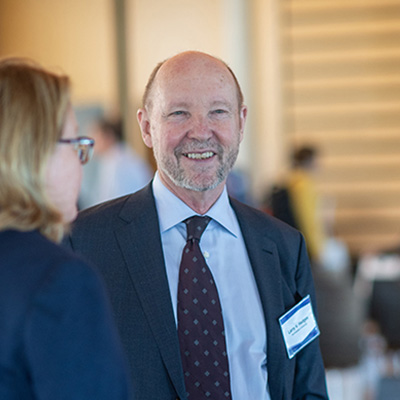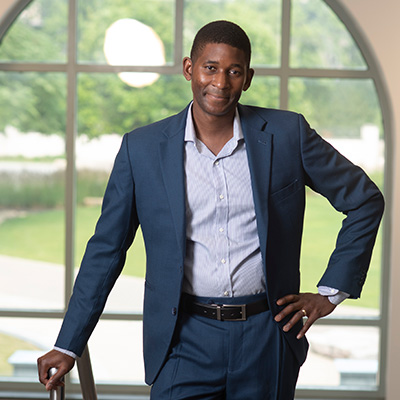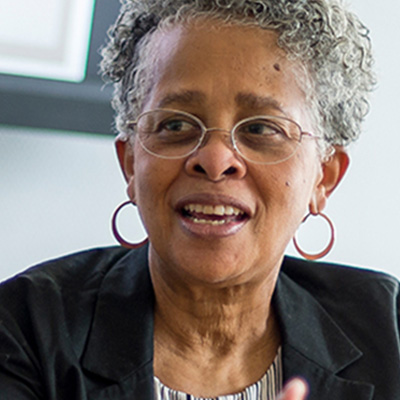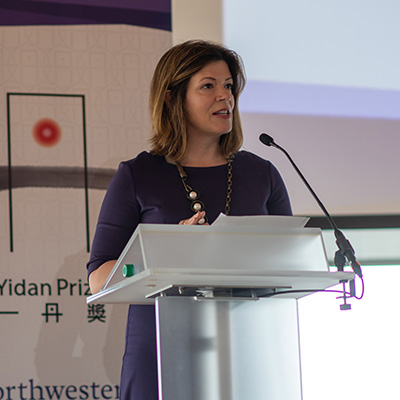Five Faculty Named 2025 Edu-Scholars

Five faculty members from Northwestern University’s School of Education and Social Policy faculty members were named to the 2025 RHSU Edu-Scholar Public Influence Rankings for their work bringing research out of academic journals and into everyday lives.
Professors Larry Hedges, Kirabo Jackson, Carol Lee, Diane Schanzenbach and James Spillane were among the 200 researchers selected from more than 20,000 university-based scholars in the US. It’s the sixth consecutive year all five have been cited and two of them—Hedges and Spillane—are first generation scholars.
"These are just some of our innovative scholars who are making important policy-related contributions related to how we imagine better educational futures," said School of Education and Social Policy Dean Bryan Brayboy, the Carlos Montezuma Professor. "The recognition is well-deserved."
Created by Frederick M. Hess, director of education policy studies for the American Enterprise Institute and an opinion blogger for Education Week, the rankings use eight publicly available metrics: Google Scholar, book points, highest Amazon ranking, syllabus points, and mentions in the education press, on the web, in newspapers, and the Congressional Record.
The final list includes the 150 top finishers from last year, augmented by "at‐large" additions named by a selection committee of 39 accomplished scholars.
The top scorers are all familiar names in the education world. Topping the rankings this year were Stanford University’s Carol Dweck, Harvard’s Howard Gardner, University of Pennsylvania’s Angela Duckworth, Harvard University’s Raj Chetty, and Stanford's Linda Darling-Hammond.
Rounding out the top 10: Columbia University’s John McWhorter, University of Texas at Austin’s David Yeager, the University of Southern California’s Shaun Harper and Pedro Noguera, and Stanford’s Jo Boaler.
The whole endeavor is an “admittedly an imperfect exercise” Hess says, and the rankings include just a sliver of faculty who are tackling education or education policy issues. The scores tend to favor senior scholars who once published a big study or a successful book as far back as 2003.
The most popular books, for example, are generally the same every year and include:
- Emily Oster’s Expecting Better: Why the Conventional Pregnancy Wisdom Is Wrong—and What You Really Need to Know (2014),
- Carol Dweck’s Mindset: The New Psychology of Success (2007),
- Angela Duckworth’s Grit: The Power of Passion and Perseverance (2016),
- Howard Gardner’s Frames of Mind: The Theory of Multiple Intelligences (2011),
- Gholdy Muhammad’s Unearthing Joy: A Guide to Culturally and Historically Responsive Curriculum and Instruction (2023),
- John McWhorter’s The Power of Babel: A Natural History of Language (2003).
Read more about SESP’s winners:
 Larry Hedges, Board of Trustees Professor, is best known for developing statistical methods for meta-analysis (a statistical analysis of the results of multiple studies that combines their findings) in the social, medical, and biological sciences. He received the José Vasconcelos World Award of Education from the World Cultural Council in 2023. In 2018, Hedges received the Yidan Prize in Education Research the world’s largest education award. The Board of Trustees Professor of Statistics and Social Policy, Hedges is among the most cited scholars on the list with 134,769 citations throughout his career. His 2021 book Introduction to Meta-Analysis has been referenced 20,974 times, according to Google Scholar. His 2014 book, Statistical Methods for Meta-Analysis has more than 19,000 citations. Hedges has been on the Edu-Scholar list since 2019.
Larry Hedges, Board of Trustees Professor, is best known for developing statistical methods for meta-analysis (a statistical analysis of the results of multiple studies that combines their findings) in the social, medical, and biological sciences. He received the José Vasconcelos World Award of Education from the World Cultural Council in 2023. In 2018, Hedges received the Yidan Prize in Education Research the world’s largest education award. The Board of Trustees Professor of Statistics and Social Policy, Hedges is among the most cited scholars on the list with 134,769 citations throughout his career. His 2021 book Introduction to Meta-Analysis has been referenced 20,974 times, according to Google Scholar. His 2014 book, Statistical Methods for Meta-Analysis has more than 19,000 citations. Hedges has been on the Edu-Scholar list since 2019.
 Kirabo Jackson recently returned from Washington, DC, where he served on the White House Council of Economic Advisors (CEA). His selection for the CEA is a testament to his extraordinary contributions to the field of education policy. Jackson, the Abraham Harris Professor of Education and Social Policy, has demonstrated the long-term effects of public school funding on student outcomes, introduced new methods for evaluating educational interventions and explored how teachers and teacher labor markets shape student success. He has been elected to the National Academy of Arts and Sciences, the National Academy of Education and won the David N. Kershaw Award from the the Association for Public Policy Analysis and Management. Jackson has been recognized as an Edu-Scholar since 2016.
Kirabo Jackson recently returned from Washington, DC, where he served on the White House Council of Economic Advisors (CEA). His selection for the CEA is a testament to his extraordinary contributions to the field of education policy. Jackson, the Abraham Harris Professor of Education and Social Policy, has demonstrated the long-term effects of public school funding on student outcomes, introduced new methods for evaluating educational interventions and explored how teachers and teacher labor markets shape student success. He has been elected to the National Academy of Arts and Sciences, the National Academy of Education and won the David N. Kershaw Award from the the Association for Public Policy Analysis and Management. Jackson has been recognized as an Edu-Scholar since 2016.
 Carol D. Lee is professor emerita and the former Edwina S. Tarry Professor of Education in the School of Education and Social Policy and in African American Studies. The current president of the National Academy of Education and a member of the National Academy of Arts and Sciences, she was recently elected chair of the National Board for Education Sciences and is a fellow of the American Educational Research Association. Lee, who has been an Edu-Scholar for a decade, is widely known for her research that shows the importance of drawing on students’ cultural knowledge to support rigorous learning, and she is the co-founder of four African-centered schools with a 40-year history.
Carol D. Lee is professor emerita and the former Edwina S. Tarry Professor of Education in the School of Education and Social Policy and in African American Studies. The current president of the National Academy of Education and a member of the National Academy of Arts and Sciences, she was recently elected chair of the National Board for Education Sciences and is a fellow of the American Educational Research Association. Lee, who has been an Edu-Scholar for a decade, is widely known for her research that shows the importance of drawing on students’ cultural knowledge to support rigorous learning, and she is the co-founder of four African-centered schools with a 40-year history.
 Diane Schanzenbach is the Margaret Walker Alexander Professor and an economist who studies policies that help children living in poverty, including education, health, and income support policies. Her work traces the impact of major public policies such as the Food Stamp Program, school finance reform, and early childhood education on children’s long-term outcomes. Seven of her studies were cited in the 2023 White House Council of Economic Advisers' Report to the president and her research is regularly cited in top media outlets. She has testified before both the Senate and House of Representatives on her research. She is an elected member of the National Academy of Education and the National Academy of Social Insurance. She was first recognized as an Edu-Scholar in 2020.
Diane Schanzenbach is the Margaret Walker Alexander Professor and an economist who studies policies that help children living in poverty, including education, health, and income support policies. Her work traces the impact of major public policies such as the Food Stamp Program, school finance reform, and early childhood education on children’s long-term outcomes. Seven of her studies were cited in the 2023 White House Council of Economic Advisers' Report to the president and her research is regularly cited in top media outlets. She has testified before both the Senate and House of Representatives on her research. She is an elected member of the National Academy of Education and the National Academy of Social Insurance. She was first recognized as an Edu-Scholar in 2020.
 James Spillane, the Spencer T. and Ann W. Olin Professor in Learning and Organizational Change, is one of the world’s top thinkers on school leadership issues, change within organizations, and policy implementation at the state, school, and classroom levels. Known for his collaborative work and ability to bridge disciplines, he explores how leaders build education systems and make instructional decisions. Leadership used to be viewed as top down; teachers were independent contractors, working alone and behind closed doors. Spillane’s work indicates that teachers may benefit from casually bumping into one another in hallways and that school leadership improves when a distributed approach is used. A first-generation high school and college student from rural Ireland, Spillane has been elected to the American Academy of Arts and Sciences and the National Academy of Education. He has been on the Edu-Scholar's list since 2016.
James Spillane, the Spencer T. and Ann W. Olin Professor in Learning and Organizational Change, is one of the world’s top thinkers on school leadership issues, change within organizations, and policy implementation at the state, school, and classroom levels. Known for his collaborative work and ability to bridge disciplines, he explores how leaders build education systems and make instructional decisions. Leadership used to be viewed as top down; teachers were independent contractors, working alone and behind closed doors. Spillane’s work indicates that teachers may benefit from casually bumping into one another in hallways and that school leadership improves when a distributed approach is used. A first-generation high school and college student from rural Ireland, Spillane has been elected to the American Academy of Arts and Sciences and the National Academy of Education. He has been on the Edu-Scholar's list since 2016.